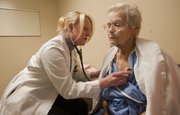
Photo by Richard Gwin
Lawrence Memorial Hospital cardiologist Elizabeth Guastello listens to the heart of patient Carole Klopp, of Lawrence, on Wednesday. Guastello, who started at the hospital in September, has been trying to raise awareness about women's heart health with the help of colleague Christina Salazar.
Jodi Jackson was only 42 years old when she suffered a widow-maker. The type of heart attack got that name due to its high mortality rate, but also because heart disease has long been assumed to be a man's problem. The Eudora woman wants to change that.
"Heart disease is the No. 1 killer of women," said Jackson, who now travels the region speaking to women about the importance of heart health. "It kills 1 in 3 women, or about one woman a minute in the United States."
Jackson is one of the lucky ones. Nationwide, women have a higher mortality rate from heart attacks than men, in part because they often display different symptoms. Jackson, for instance, was suffering from jaw pain, headaches, indigestion — not typically thought of as heart attack indicators, though they are for women. She did call an ambulance, but if she hadn't been home alone — who knows?
"If I had anybody else there, I could have convinced them to talk me out of going to the hospital," said Jackson, who, with her husband, has five children and one grandchild. "The doctor that I saw said that, 'If you had laid down, you would not have gotten up.'"
February is heart health month in America, and local doctors and advocacy groups have made it a priority to raise awareness about the dangers of heart disease in women.
At Lawrence Memorial Hospital, two new cardiologists have lately been on a mission to encourage women to look after their heart health. Elizabeth Guastello and Christina Salazar began in September and have since started Take Heart, a heart-risk assessment program designed specifically for women.
While risk factors are the same for men and women — high blood pressure, high cholesterol, diabetes, smoking, family history — women with diabetes and high triglycerides are at a greater risk for heart disease than men with similar health conditions. They are also more apt to become obese after menopause.
The real difference, however, comes in the symptoms.
Both men and women get pain in the chest and arm to signify an oncoming heart attack, but women are more likely to present more general symptoms, like nausea, neck pain and fatigue.
"Our symptoms can be more vague, so we sit on the symptoms longer and don't seek help," Guastello said. "We don't go to an emergency room. We wait until Monday to get in with our doctor.
"With a disease where time is of the essence — a heart attack — we sit and wait."
Guastello and Salazar also hope to increase the number of female cardiologists, by, if nothing else, being role models to younger women. About 10 percent of practicing cardiologists are female, including only about a dozen in Kansas, Salazar noted.
"Typically people thought of cardiology as a field that's not easy for a woman who's married or has kids or a husband who's working," she said. "You can make a path that fits your lifestyle, no matter what field you choose. You don't have to work 80 hours a week to do what you want."
Awareness about women's heart health does appear to be spreading. Fifty-six percent of women now recognize heart disease as the leading cause of death among women, up from 30 percent in 1997, according to the American Heart Association.
The disease was long considered a man's illness because premenopausal women rarely got it, said Ashley Simmons, medical director of the women's heart health center at Kansas University Hospital. Now, with the increase in obesity and diabetes in America, more younger women are contracting heart disease. It has also often been overshadowed by breast cancer, the awareness of which has been spread remarkably by groups like Susan G. Komen for the Cure.
"Most women think of heart disease as a man's disease or are more afraid of breast cancer or another cancer," Simmons said. "In reality, heart disease kills more women than all cancers combined."
She said women also tend to enroll in cardiac rehabilitation at a lower rate than men, leaving them susceptible to further heart problems, particularly after surgery.
One thing about heart disease, however, remains the same no matter your sex: how to prevent it. That can be done by exercising, not smoking and eating a healthy diet.
Six weeks before the heart attack that almost killed her, Jackson had a physical at which she received a clean bill of health. She had no family history of heart problems. Instead, her attack was caused by a sudden plaque breakage, after which blood raced to the heart and clotted, blocking an artery.
Still, Jackson has since gone vegan and started exercising. She has no residual pain, though she will have to take cardiac medicine for the rest of her life.
While she'll continue to be vigilant about her own heart health, she can understand how other women often overlook it. It's one reason she's now a dedicated activist.
"Women are multi-taskers. They're fixing dinner and getting homework done, and they start to not feel good. So they'll say, 'Maybe I'll get to it after I'm done with this.' They don't slow down and pay attention to the symptoms they're having," she said.
"Women are often the primary caretaker and make sure everyone around them is doing OK, and they don't take care of themselves."